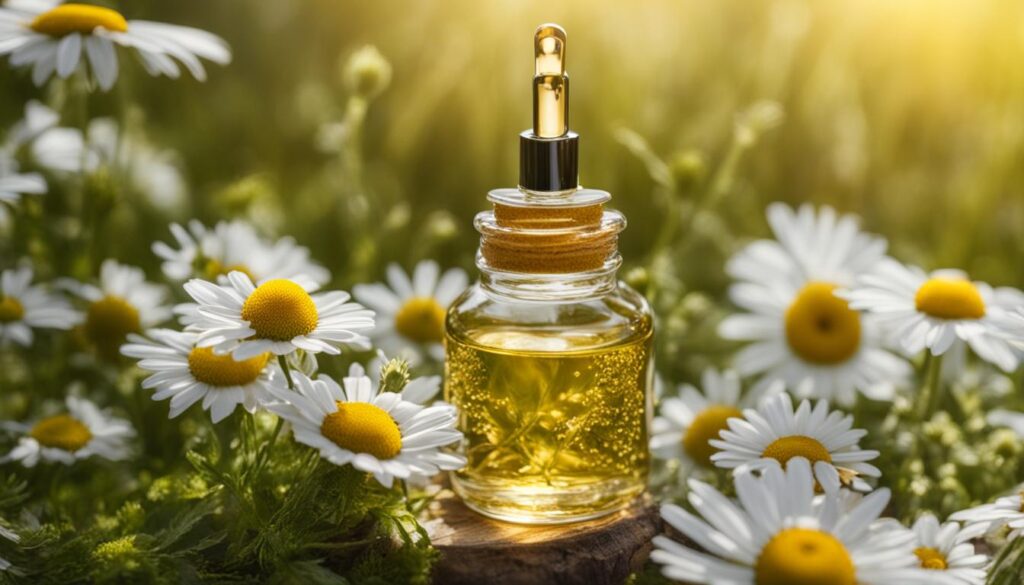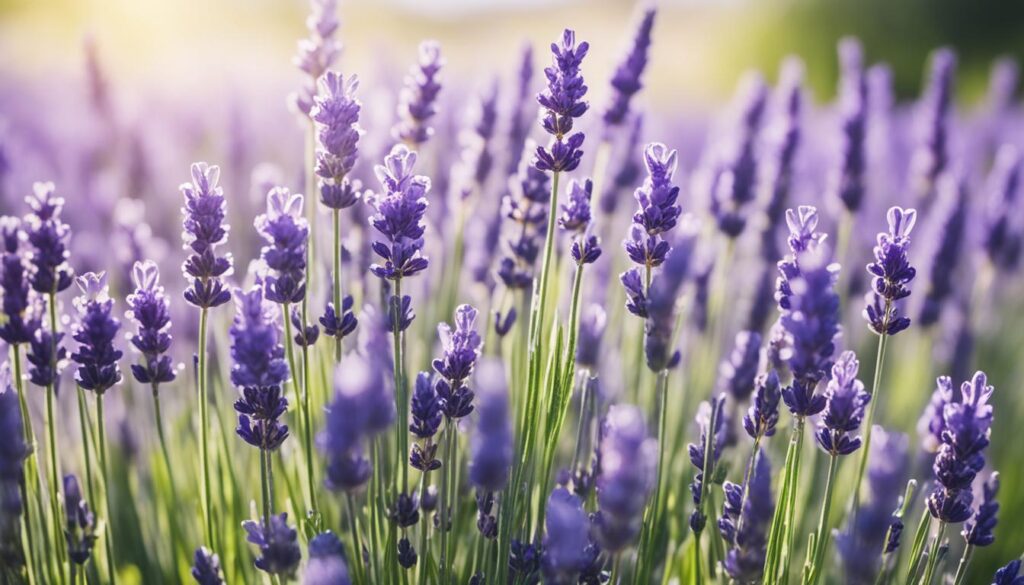As a skincare enthusiast, I have always been on the lookout for natural ingredients that deliver remarkable results. One such ingredient that has caught my attention is chamomile oil. With its numerous benefits and versatility, chamomile oil has become a staple in my skincare routine. In this guide, I will share with you the wonders of chamomile oil for radiant and healthy skin.
Chamomile essential oil is derived from the chamomile flower. It is renowned for its soothing and calming properties, making it an ideal choice for sensitive skin. But chamomile oil offers much more than just that. It has antioxidant properties that protect the skin against free radicals, reducing the signs of aging and promoting a youthful complexion. Its moisturizing abilities leave the skin soft and hydrated, while also helping to reduce stretch marks and acne.
One of the best things about chamomile oil is its compatibility with other oils. When combined with coconut oil or olive oil, it can address specific skincare needs such as dryness or oiliness. This oil also has haircare benefits, promoting healthy and shiny locks. And let’s not forget its aromatherapy benefits, which can help you relax and unwind after a long day.
Key Takeaways:
- Chamomile oil offers numerous benefits for skin health, including antioxidant protection and moisturization.
- It is particularly suitable for sensitive skin and can be combined with other oils for specific skincare needs.
- Chamomile oil can also be used for haircare purposes and provides aromatherapy benefits.
- When using chamomile oil, it is important to dilute it with a carrier oil and conduct a patch test for allergic reactions.
- Consulting a dermatologist or healthcare professional is recommended, especially during pregnancy or if you have specific skin conditions.
How to Use Chamomile Oil for Skin
Chamomile oil is a wonderful addition to your skincare routine, offering numerous benefits for different skin types and concerns. Whether you have sensitive skin, acne-prone skin, dry skin, or oily skin, chamomile oil can be beneficial in addressing your specific needs.
Moisturize and Nourish Your Face
One of the simplest ways to incorporate chamomile oil into your skincare routine is by using it as a moisturizer. Mix a few drops of chamomile oil with aloe vera gel and honey to create a hydrating and nourishing face mask. Apply the mixture to your face and leave it on for 15-20 minutes before rinsing it off with lukewarm water. This will help soothe and moisturize your skin, leaving it soft and supple.
Combat Acne and Inflammation
If you struggle with acne or inflammation, chamomile oil can be a natural remedy to add to your skincare arsenal. Dilute chamomile oil with a carrier oil such as jojoba or grapeseed oil and apply it to the affected areas using a cotton pad or your fingertips. Chamomile oil’s anti-inflammatory properties can help calm redness and irritation while its antibacterial properties can combat acne-causing bacteria.
Soothe and Protect Sensitive Skin
Chamomile oil is known for its gentle and soothing properties, making it an excellent choice for those with sensitive skin. To create a chamomile oil face pack, mix chamomile oil with a few drops of lemon juice and gram flour to form a smooth paste. Apply the pack to your face and let it sit for 10-15 minutes before rinsing it off. This will help calm sensitive skin and reduce any redness or irritation.
Hydrate Dry Skin
If you have dry skin, chamomile oil can provide much-needed hydration and nourishment. Combine chamomile oil with a carrier oil like almond oil or avocado oil and massage it onto clean, dry skin. This will help lock in moisture, leaving your skin feeling soft, smooth, and hydrated.
Balance Excess Oil on Oily Skin
Contrary to popular belief, chamomile oil can also be beneficial for oily skin. It can help balance excess oil production and reduce the appearance of greasy skin. Mix a few drops of chamomile oil with a carrier oil like grapeseed oil or jojoba oil and apply it to your face using gentle, upward motions. This will help regulate oil production and give your skin a healthy glow.

Remember, it’s important to dilute chamomile oil with a carrier oil before applying it to your skin, especially if you have sensitive skin. Conduct a patch test before use to check for any adverse reactions. Incorporating chamomile oil into your skincare routine can help enhance your complexion and promote overall skin health.
The Holistic Skin Care Benefits of Essential Oils
Essential oils have been used in skincare for centuries due to their various skin-nourishing properties. These oils offer a natural and holistic approach to skincare, providing numerous benefits for the skin.
Key Benefits of Essential Oils for Skin
- Antioxidant and Antimicrobial Protection: Essential oils are rich in antioxidants that help protect the skin from environmental damage and reduce the signs of aging. They also possess antimicrobial properties that can combat acne-causing bacteria.
- Balance Skin Oils: Certain essential oils, such as tea tree oil and lavender oil, can help regulate excess oil production in oily skin and provide hydration for dry skin.
- Reduce Inflammation and Irritation: Essential oils like chamomile oil and lavender oil have anti-inflammatory properties that soothe and calm irritated skin, reducing redness and discomfort.
- Preserve Skin Moisture: Essential oils, such as geranium oil and rosehip oil, help retain moisture in the skin, preventing dryness and improving overall hydration.
- Support Skin Repair: Essential oils promote skin regeneration and repair damaged skin cells, aiding in the healing process of wounds, scars, and blemishes.
- Improve Appearance of Fine Lines and Wrinkles: Many essential oils, including frankincense oil and rosehip oil, possess properties that help reduce the appearance of fine lines and wrinkles, promoting a more youthful complexion.
Essential oils can be personalized based on specific skincare needs and incorporated into DIY products like facial masks and scrubs for optimal results. Their natural variety and easy absorption into the skin make them a popular ingredient in both traditional and commercial skincare products.
“Essential oils offer a holistic and natural approach to skincare, providing a wide range of benefits for the skin. From their antioxidant and antimicrobial properties to their ability to balance oil production and promote skin repair, essential oils are a valuable addition to any skincare routine.”

To harness the benefits of essential oils for your skin, it’s important to choose high-quality, pure essential oils and dilute them properly before use. Conduct a patch test to check for any allergic reactions and consult a dermatologist or healthcare professional if you have any specific skin concerns or conditions.
By incorporating essential oils into your skincare regimen, you can enjoy the natural and holistic benefits they provide, promoting healthier, radiant skin.
A Complete Guide to Essential Oils for Skin
When it comes to skincare, essential oils have become increasingly popular due to their natural properties and numerous benefits. From lavender to tea tree, rosehip to geranium, essential oils offer specific advantages for different skin types and various skin concerns. In this section, I will provide a comprehensive guide to some of the most widely used essential oils for skin and their unique benefits.
Lavender Oil
Lavender oil is known for its soothing properties, making it ideal for irritated and sensitive skin. It can help alleviate skin redness, inflammation, and acne. Its gentle nature makes it suitable for all skin types. Lavender oil also has a calming aroma that can promote relaxation and improve sleep quality.
Tea Tree Oil
Tea tree oil is highly regarded for its ability to combat acne and regulate oil production. It has powerful antimicrobial properties that help reduce bacteria on the skin, preventing breakouts. Tea tree oil is also effective in reducing inflammation and promoting clear, healthy-looking skin.
Rosehip Oil
Rosehip oil is a popular choice for promoting skin regeneration and reducing the appearance of scars and fine lines. It is rich in essential fatty acids, vitamins, and antioxidants that support collagen production and improve skin elasticity. Rosehip oil is particularly beneficial for mature or damaged skin.
Frankincense Oil
Frankincense oil is renowned for its anti-aging properties. It helps tone and tighten the skin, reducing the appearance of wrinkles and fine lines. Frankincense oil also promotes cell regeneration and supports overall skin health.
Geranium Oil
Geranium oil is known for its ability to improve blood circulation, resulting in healthier and more radiant-looking skin. It helps tighten the skin, reduce the appearance of large pores, and promote an even skin tone. Geranium oil is suitable for all skin types.
Ylang-Ylang Oil
Ylang-ylang oil is a versatile essential oil that suits both dry and oily skin types. It helps balance sebum production, making it beneficial for those with oily or combination skin. Ylang-ylang oil also has moisturizing properties, providing hydration for dry skin.
Carrot Seed Oil
Carrot seed oil is rich in antioxidants, making it great for combatting free radicals and promoting youthful-looking skin. It helps protect the skin from environmental stressors and supports skin elasticity and firmness. Carrot seed oil is particularly beneficial for mature or sun-damaged skin.
Chamomile Oil
Chamomile oil is gentle and soothing, making it suitable for sensitive skin. It helps calm redness and irritation, providing relief for conditions like eczema and rosacea. Chamomile oil also has moisturizing properties, keeping the skin hydrated and nourished.
These are just a few examples of essential oils and their benefits for skin health. Incorporating these oils into your skincare routine can help address various skin concerns and promote overall skin wellness. Remember to dilute essential oils with a carrier oil before applying them to the skin and perform a patch test to check for any potential allergic reactions.

How to Use Essential Oils Safely on Skin
When it comes to incorporating essential oils into your skincare routine, safety should be your top priority. Taking the necessary precautions ensures that you can enjoy the benefits of these oils without any adverse reactions. Here are some important guidelines to follow:
1. Conduct a patch test: Before applying any essential oil directly to your skin, it’s crucial to conduct a patch test. Apply a small amount of diluted oil to a discreet area, such as your inner arm, and wait for 24 hours. If you experience any redness, itching, or irritation, avoid using that particular oil on your skin.
2. Dilute essential oils: Essential oils are highly concentrated and powerful, so it’s necessary to dilute them before applying to the skin. Mix a few drops of your chosen essential oil with a carrier oil, such as jojoba oil or coconut oil, to reduce its potency. This not only ensures safe application but also allows for even distribution on the skin.
3. Seek professional advice: If you are pregnant, nursing, or have any existing skin conditions, consulting a dermatologist or healthcare professional is crucial before using essential oils. They will provide personalized guidance based on your specific circumstances and help you determine which oils are safe for you to use. It’s always better to be safe and informed.
By following these safety guidelines – conducting a patch test, diluting essential oils, and seeking professional advice when necessary – you can confidently incorporate essential oils into your skincare routine. Remember, the key to using essential oils on the skin is to prioritize safety and enjoy the enriching benefits these oils have to offer.
FAQ
What are the benefits of chamomile oil for skin?
Chamomile oil offers numerous benefits for the skin, including protection against free radicals, moisturization, reduction of stretch marks and acne, and anti-aging properties.
Is chamomile oil suitable for sensitive skin?
Yes, chamomile oil is gentle and suitable for sensitive skin. Its soothing properties make it an excellent choice for those with sensitive or easily irritated skin.
How can I incorporate chamomile oil into my skincare routine?
There are several ways to use chamomile oil for skincare. You can mix it with aloe vera gel and honey for a moisturizer, combine it with oats and honey for an exfoliating scrub, or create a face pack by mixing it with lemon juice and gram flour.
Can chamomile oil be used for acne-prone skin?
Yes, chamomile oil can be beneficial for acne-prone skin. It has anti-inflammatory properties that can help reduce the redness and swelling associated with acne.
Can chamomile oil be used for dry skin?
Absolutely! Chamomile oil is moisturizing and can help hydrate and nourish dry skin, leaving it feeling soft and supple.
Can chamomile oil be used for oily skin?
Yes, chamomile oil is suitable for oily skin as well. Its gentle nature can help balance oil production and reduce excess sebum, without causing dryness or irritation.
What are the benefits of essential oils for skin?
Essential oils offer various benefits for the skin, including antioxidant and antimicrobial protection, oil balancing, inflammation reduction, moisture preservation, support for skin repair, and improvement in the appearance of fine lines and wrinkles.
Are essential oils safe to use on the skin?
Essential oils can be safe for use on the skin when used correctly. It is important to conduct a patch test before application, dilute essential oils with carrier oils, and consult a dermatologist or healthcare professional if you are pregnant, nursing, or have any skin conditions.
Which essential oils are suitable for different skin types?
Lavender oil soothes irritated skin and prevents acne, tea tree oil combats acne and regulates oil production, rosehip oil promotes skin regeneration and collagen production, frankincense oil is ideal for aging skin and toning, geranium oil tightens skin and improves blood circulation, ylang-ylang oil suits both dry and oily skin types, carrot seed oil has antioxidant properties, and chamomile oil is gentle and suitable for sensitive skin.
How should essential oils be diluted for skincare use?
It is recommended to dilute essential oils with carrier oils before applying them to the skin. This helps reduce their potency and minimizes the risk of irritation or adverse reactions.






